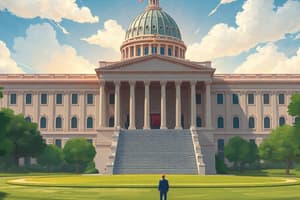Podcast
Questions and Answers
What is the primary role of Congress?
What is the primary role of Congress?
- To elect the President
- To make the laws of the land (correct)
- To serve as the judicial branch
- To represent the interests of the executive branch
What is the main reason for reapportionment and redistricting?
What is the main reason for reapportionment and redistricting?
- To ensure equal representation for all citizens (correct)
- To reduce the number of congressional districts
- To give more power to the President
- To increase the number of politicians in Congress
What is the primary difference between presidential and congressional campaigns?
What is the primary difference between presidential and congressional campaigns?
- Presidential campaigns focus on national issues, while congressional campaigns focus on local issues (correct)
- Presidential campaigns are more expensive, while congressional campaigns are less expensive
- Presidential campaigns focus on local issues, while congressional campaigns focus on national issues
- Presidential campaigns are shorter, while congressional campaigns are longer
What is the main goal of party nomination in Congress?
What is the main goal of party nomination in Congress?
What is a key factor that influences election outcomes?
What is a key factor that influences election outcomes?
What is the primary responsibility of Congress in the legislative process?
What is the primary responsibility of Congress in the legislative process?
What is the purpose of reapportionment?
What is the purpose of reapportionment?
What is a key difference between party nomination in Congress and other elections?
What is a key difference between party nomination in Congress and other elections?
What is a national force that influences Congressional elections?
What is a national force that influences Congressional elections?
What is a factor that can influence the outcome of Congressional elections?
What is a factor that can influence the outcome of Congressional elections?
What is the primary function of reapportionment?
What is the primary function of reapportionment?
What is a key difference between Congressional and Presidential campaigns?
What is a key difference between Congressional and Presidential campaigns?
What is a major influence on Congressional election outcomes?
What is a major influence on Congressional election outcomes?
What is the primary purpose of party nomination in Congress?
What is the primary purpose of party nomination in Congress?
What is a national force that influences Congressional elections?
What is a national force that influences Congressional elections?
What is the primary purpose of reapportionment and redistributing congressional districts?
What is the primary purpose of reapportionment and redistributing congressional districts?
What is a key factor in the electoral evolution of Congress?
What is a key factor in the electoral evolution of Congress?
What is the primary role of party nomination in Congressional elections?
What is the primary role of party nomination in Congressional elections?
What is a key difference between Presidential and Congressional campaigns?
What is a key difference between Presidential and Congressional campaigns?
What is a national force that influences Congressional elections?
What is a national force that influences Congressional elections?
Flashcards are hidden until you start studying
Study Notes
The Role of Congress
- The primary role of Congress is to make laws, approve presidential appointments, and exercise legislative power.
Evolution of Congress
- The electoral evolution of Congress involved the transition from indirect election of Senators by state legislatures to direct election by the people.
- The 17th Amendment (1913) established the direct election of Senators by the people.
Reapportionment and Redistricting
- Reapportionment is the process of reallocating congressional seats among states based on population changes.
- Redistributing congressional districts is necessary to ensure equal representation and prevent gerrymandering.
Party Nomination
- Party nomination is the process by which political parties select their candidates for the general election.
- Nominees are chosen through primaries, caucuses, or conventions.
National Forces Influencing Congress
- National forces that influence Congress include public opinion, interest groups, and the media.
Presidential vs. Congressional Campaigns
- Presidential campaigns focus on national issues and personas, while Congressional campaigns focus on local issues and district-specific concerns.
- Presidential campaigns are often more expensive and receive more media attention.
Factors Influencing Election Outcomes
- Factors that influence election outcomes include voter turnout, incumbency, party identification, and campaign spending.
The Role of Congress
- The primary role of Congress is to make laws, approve presidential appointments, and exercise legislative power.
Evolution of Congress
- The electoral evolution of Congress involved the transition from indirect election of Senators by state legislatures to direct election by the people.
- The 17th Amendment (1913) established the direct election of Senators by the people.
Reapportionment and Redistricting
- Reapportionment is the process of reallocating congressional seats among states based on population changes.
- Redistributing congressional districts is necessary to ensure equal representation and prevent gerrymandering.
Party Nomination
- Party nomination is the process by which political parties select their candidates for the general election.
- Nominees are chosen through primaries, caucuses, or conventions.
National Forces Influencing Congress
- National forces that influence Congress include public opinion, interest groups, and the media.
Presidential vs. Congressional Campaigns
- Presidential campaigns focus on national issues and personas, while Congressional campaigns focus on local issues and district-specific concerns.
- Presidential campaigns are often more expensive and receive more media attention.
Factors Influencing Election Outcomes
- Factors that influence election outcomes include voter turnout, incumbency, party identification, and campaign spending.
The Role of Congress
- The primary role of Congress is to make laws, approve presidential appointments, and exercise legislative power.
Evolution of Congress
- The electoral evolution of Congress involved the transition from indirect election of Senators by state legislatures to direct election by the people.
- The 17th Amendment (1913) established the direct election of Senators by the people.
Reapportionment and Redistricting
- Reapportionment is the process of reallocating congressional seats among states based on population changes.
- Redistributing congressional districts is necessary to ensure equal representation and prevent gerrymandering.
Party Nomination
- Party nomination is the process by which political parties select their candidates for the general election.
- Nominees are chosen through primaries, caucuses, or conventions.
National Forces Influencing Congress
- National forces that influence Congress include public opinion, interest groups, and the media.
Presidential vs. Congressional Campaigns
- Presidential campaigns focus on national issues and personas, while Congressional campaigns focus on local issues and district-specific concerns.
- Presidential campaigns are often more expensive and receive more media attention.
Factors Influencing Election Outcomes
- Factors that influence election outcomes include voter turnout, incumbency, party identification, and campaign spending.
The Role of Congress
- The primary role of Congress is to make laws, approve presidential appointments, and exercise legislative power.
Evolution of Congress
- The electoral evolution of Congress involved the transition from indirect election of Senators by state legislatures to direct election by the people.
- The 17th Amendment (1913) established the direct election of Senators by the people.
Reapportionment and Redistricting
- Reapportionment is the process of reallocating congressional seats among states based on population changes.
- Redistributing congressional districts is necessary to ensure equal representation and prevent gerrymandering.
Party Nomination
- Party nomination is the process by which political parties select their candidates for the general election.
- Nominees are chosen through primaries, caucuses, or conventions.
National Forces Influencing Congress
- National forces that influence Congress include public opinion, interest groups, and the media.
Presidential vs. Congressional Campaigns
- Presidential campaigns focus on national issues and personas, while Congressional campaigns focus on local issues and district-specific concerns.
- Presidential campaigns are often more expensive and receive more media attention.
Factors Influencing Election Outcomes
- Factors that influence election outcomes include voter turnout, incumbency, party identification, and campaign spending.
Studying That Suits You
Use AI to generate personalized quizzes and flashcards to suit your learning preferences.





